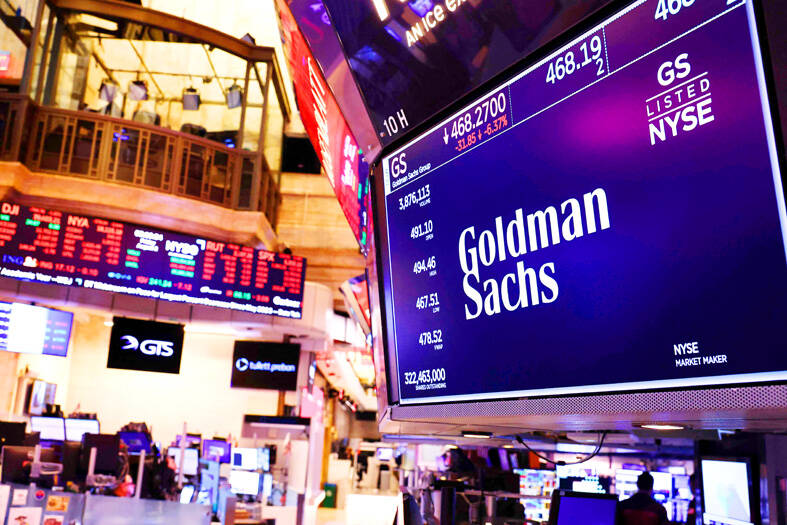Goldman Sachs Group Inc is walking away from the world’s biggest climate alliance for banks, in the latest sign that Wall Street is recalibrating its affiliation with such groups.
Goldman has decided to no longer be a member of the Net-Zero Banking Alliance (NZBA), the company said in a statement on Friday.
Firms are struggling to adapt to a deluge of increasingly fragmented environmental, social and governance (ESG) requirements from various standard-setters and jurisdictions. Goldman’s decision to leave NZBA was largely motivated by a need to comply with mandatory reporting guidelines, a person familiar with the matter said, adding that it would be helped by the rollout of the EU’s Corporate Sustainability Reporting Directive, the person said.

Photo: Getty Images via AFP
“We have the capabilities to achieve our goals and to support the sustainability objectives of our clients,” the bank said in a statement. “Goldman Sachs is also very focused on the increasingly elevated sustainability standards and reporting requirements imposed by regulators around the world.”
A spokesperson for NZBA declined to comment. Members of the group commit to achieving net zero financed emissions by 2050 at the latest and to set interim five-year decarbonization targets.
The move comes amid intense and growing pressure from the US Republican Party on such coalitions, as part of a wider attack by the party on what it has characterized as “woke” capitalism. Last week, Texas Attorney General Ken Paxton led a move to sue BlackRock Inc, Vanguard Group Inc and State Street Corp for allegedly breaching antitrust laws by using climate-friendly investment strategies to suppress the supply of coal.
That suit followed bans against ESG investing across numerous Republican-controlled states, with pressure expected to step up now that US president-elect Donald Trump is headed for a second term in the White House.
Against that backdrop, banks and asset managers have scaled back their association with high-profile climate groups.
In August, the asset management arm of Goldman said it had quit the world’s biggest climate alliance for investors, known as Climate Action 100+ (CA100+). Other firms that have quit the alliance include the asset management arm of JPMorgan Chase & Co and Pacific Investment Management Co.
On Friday, Franklin Templeton said it “won’t renew its status” as a signatory with CA100+.
CA100+, the world’s largest investor group formed to fight climate change, had been helpful in providing early-stages support, but Franklin Templeton has now built enough internal expertise around climate investing to no longer require the assistance of the group, the company said in a statement.
A separate climate alliance for insurers, NZIA, was gripped by an exodus last year, as firms responded to threats of antitrust litigation brought by US Republican state attorneys general, while a net zero alliance for asset managers suffered a blow when Vanguard, the world’s second-largest money manager, quit back in 2022.

SEMICONDUCTORS: The German laser and plasma generator company will expand its local services as its specialized offerings support Taiwan’s semiconductor industries Trumpf SE + Co KG, a global leader in supplying laser technology and plasma generators used in chip production, is expanding its investments in Taiwan in an effort to deeply integrate into the global semiconductor supply chain in the pursuit of growth. The company, headquartered in Ditzingen, Germany, has invested significantly in a newly inaugurated regional technical center for plasma generators in Taoyuan, its latest expansion in Taiwan after being engaged in various industries for more than 25 years. The center, the first of its kind Trumpf built outside Germany, aims to serve customers from Taiwan, Japan, Southeast Asia and South Korea,

Gasoline and diesel prices at domestic fuel stations are to fall NT$0.2 per liter this week, down for a second consecutive week, CPC Corp, Taiwan (台灣中油) and Formosa Petrochemical Corp (台塑石化) announced yesterday. Effective today, gasoline prices at CPC and Formosa stations are to drop to NT$26.4, NT$27.9 and NT$29.9 per liter for 92, 95 and 98-octane unleaded gasoline respectively, the companies said in separate statements. The price of premium diesel is to fall to NT$24.8 per liter at CPC stations and NT$24.6 at Formosa pumps, they said. The price adjustments came even as international crude oil prices rose last week, as traders

SIZE MATTERS: TSMC started phasing out 8-inch wafer production last year, while Samsung is more aggressively retiring 8-inch capacity, TrendForce said Chipmakers are expected to raise prices of 8-inch wafers by up to 20 percent this year on concern over supply constraints as major contract chipmakers Taiwan Semiconductor Manufacturing Co (TSMC, 台積電) and Samsung Electronics Co gradually retire less advanced wafer capacity, TrendForce Corp (集邦科技) said yesterday. It is the first significant across-the-board price hike since a global semiconductor correction in 2023, the Taipei-based market researcher said in a report. Global 8-inch wafer capacity slid 0.3 percent year-on-year last year, although 8-inch wafer prices still hovered at relatively stable levels throughout the year, TrendForce said. The downward trend is expected to continue this year,

Taiwan Semiconductor Manufacturing Co (TSMC, 台積電), which supplies advanced chips to Nvidia Corp and Apple Inc, yesterday reported NT$1.046 trillion (US$33.1 billion) in revenue for last quarter, driven by constantly strong demand for artificial intelligence (AI) chips, falling in the upper end of its forecast. Based on TSMC’s financial guidance, revenue would expand about 22 percent sequentially to the range from US$32.2 billion to US$33.4 billion during the final quarter of 2024, it told investors in October last year. Last year in total, revenue jumped 31.61 percent to NT$3.81 trillion, compared with NT$2.89 trillion generated in the year before, according to